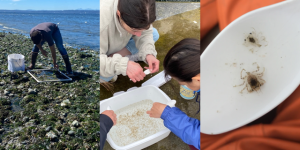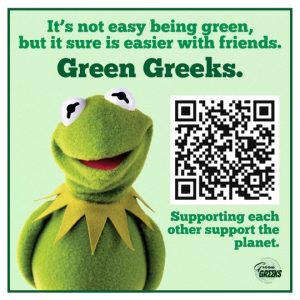
Want to gain field experience while helping to answer important questions for Dungeness crab management?
The Pacific Northwest Crab Research Group (PCRG) is a diverse group of researchers including state and tribal co-managers, federal agencies, academics, and non-profit organizations. Formed in 2018, the PCRG seeks to address multiple critical data gaps to promote and support the sustainable management and harvest of Dungeness crab (https://www.pnwcrab.com).
A top research priority of the group is to monitor abundance of larval crab (zoeae and megalopae) in Puget Sound waters using light traps. A light trap is a water bottle with funnels on the side, a buoyant lid, and a light in the center that turns on at sunset and off at sunrise. Larval crab exhibit positive phototaxis, meaning they are attracted to light. We can take advantage of this behavior with these traps, which are especially effective at capturing megalopae, the final larval stage of these crab. By counting and measuring megalopae captured in the trap, we can evaluate recruitment of Dungeness crab. Additionally, we monitor local beaches to evaluate potential bottlenecks as these larval forms transition to the juvenile stage.
Objectives
- Regularly monitor a light trap at a station in Shilshole Bay marina
- Count larval crabs and other organisms
- Measure the size of the megalope
- Observe patterns in light trap catch relative to ocean and atmospheric conditions
- Participate in bimonthly beach surveys of juvenile crab at Golden Gardens
Methods
The trap is checked every other day throughout spring and summer (April 15th – September 1st). Student(s) will need to identify a schedule to share the responsibility, which is typically a 1-2 hour time commitment during each sampling event. We’re looking for 4-5 students who could work together to sample throughout the week. Students must commit to sampling on average 3 times a week throughout the season.
During each sampling event, the trap is removed from the water and emptied into a basin. Organisms are sorted, identified, and counted before release. A subset of Dungeness crab megalopae are retained for measurement and additional tissue collection. Here’s a link to a short tutorial video (9-minutes): https://www.pnwcrab.com/larval-crab-study?wix-vod-video-id=b42f5cba46f74374be4640260a73fcac&wix-vod-comp-id=comp-kgjuvgko. And if you want more details, here’s a link to the methods paper: https://www.pnwcrab.com/_files/ugd/b705fa_80dd95db53fe42fd839883ab7f0cc621.pdf
Additional beach monitoring may occur 1-2 times a month. During each sampling event, ten quadrats are randomly selected. Using a trowel, the contents of each quadrat are excavated and sieved to remove all organisms. Crabs are sorted, identified, and counted before release. Dungeness crab are measured.
Benefits of Participation:
– Experience in field methods and best practices
– Experience in biological data collection and data management
– Experience in species identification
– Development of professional networks that span tribal, state, federal, and non-profit organizations operating in Puget Sound
– Independent study or capstone projects available
Required Qualifications:
– Positive attitude
– Willingness to learn new skills
– Willingness to work in sometimes adverse weather
– Detail-oriented and self-starter
– Reliable with good time-management
– Able to work independently and within teams
– Can commit to sampling 3 times a week (on average) throughout the season (April-September)
Desired Qualifications
– Some coursework in Marine Biology, ecology, and/or oceanography
– Coursework in data collection
– Previous lab or field experience
To Apply
– Send Resume, Cover letter, and unofficial transcript by March 20th to P. Sean McDonald, Associate Teaching Professor, UW Program on the Environment at <psean@uw.edu>. In your cover letter please indicate your preference for volunteering versus earning academic credit (independent study or capstone).
 Green Greeks is an environmental advocacy RSO on the UW campus. Their mission is to foster a positive and collaborative environment dedicated to promoting sustainable action in the community through student-led consulting, leadership, and events. Both Greek-affiliated and non-affiliated students who are passionate about sustainability and environmentalism are welcome and encouraged to join!
Green Greeks is an environmental advocacy RSO on the UW campus. Their mission is to foster a positive and collaborative environment dedicated to promoting sustainable action in the community through student-led consulting, leadership, and events. Both Greek-affiliated and non-affiliated students who are passionate about sustainability and environmentalism are welcome and encouraged to join!

